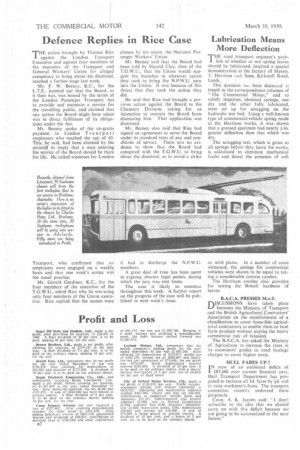Defence Replies in Rice Case T HE action brought by Thomas
Page 36

If you've noticed an error in this article please click here to report it so we can fix it.
Rice against the London Transport Executive and against four members of the executive of the Transport and General Workers' Union for alleged conspiracy to bring about his dismissal, reached a further stage last week. Mr. F. W. Beeney. K.C., for the L.T.E., pointed out that the Board, as it then was, was bound by the terms of the London Passenger Transport Act to provide and maintain a service for the travelling public, and claimed that any action the Board might have taken was in direct fulfilment of its obligations under the Act.
Mr. Beeney spoke of the ex-gratia payment to London Transport employees who reached the age of 65. This, he said, had been claimed by the plaintiff to imply that a man entering the service of the Board should be there for life. He called witnesses for London
Transport, who confirmed that aui employees were engaged on a weekly. basis and that one week's notice was the usual practice.
Mr. Gerald Gardiner, K.C., for the four members of the executive of the T.G.W.U., asked Rice why he was suing only four members of the Union executive. Rice replied that the names were
chosen by his union. the National Passenger Workers' Union.
Mr. Beeney said that the Board had been told by Harold Clay, then of the T.G.W.U., that the Union would support the branches in whatever action they took to bring the N.P:W.U. men into the Union. It was because of this threat that they took the action they did.
He said that Rice had brought a previous action against the Board in the Chancery Division, asking, for an injunction to restrain the Board from dismissing him. That application was dismissed.
Mr. Beeney also said .that Rice had signed an agreement to serve the Board under its standard rates of pay and conditions of service. There Was no evidence to 'show that the Board had conspired with the T.G.W.U. to bring about the dismissal, as to avoid a strike it had to discharge the N.P.W.U. members.
• A great deal of time has been spent in arguing obscure legal points, during which the jury was sent home.
The case is likely to continue throughout this week. A further report on the progress of the case will be published in next week's issue.




















































































